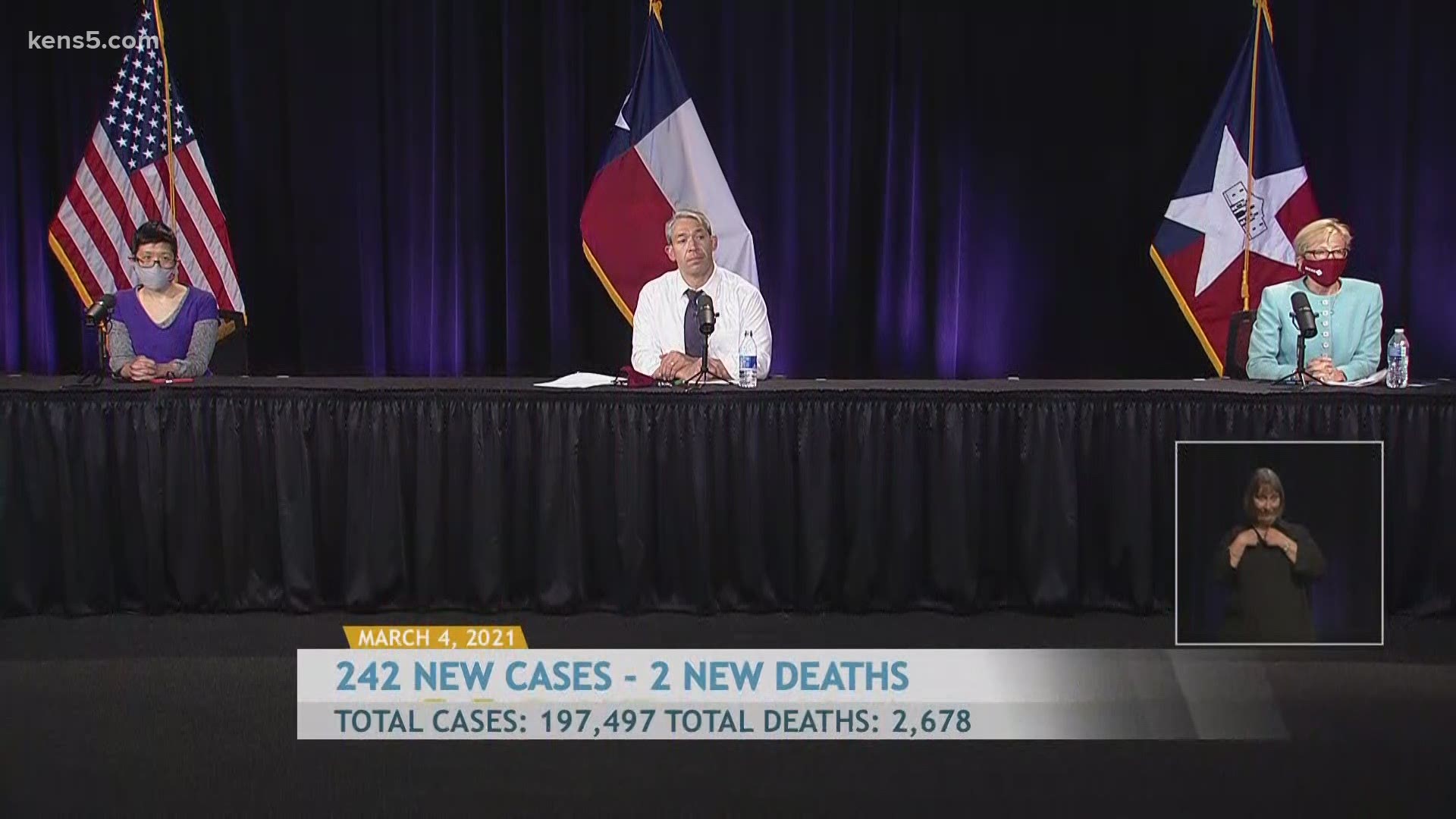SAN ANTONIO — We're tracking the latest numbers from the coronavirus pandemic in San Antonio and across Texas. Here are the latest numbers reported by Bexar and surrounding counties:
- Bexar County: On Thursday, 242 new cases were reported, bringing the total number of cases to 197,497. Two new deaths were reported, bringing the local death toll from virus complications to 2,678.
- Hays County: On Thursday, officials reported 23 new cases in the county and one additional COVID-related fatality. There is now a total of 16,458 lab-confirmed local cases, while the death toll increased to 225. Officials estimate 15,619 residents have recovered, while 614 are still ill with the virus.
- Comal County: Officials reported 17 new cases and eight backlogged cases on Thursday, along with no additional virus-related deaths. As of Thursday, 9,246 total COVID-19 cases have been reported, including 4,874 confirmed and 4,352 probable cases, while 294 county residents have died due to COVID-19 complications.
More county case information is available through the Texas Department of Health Services COVID-19 dashboard.
How Bexar County is trending
We've tracked how many coronavirus cases have been confirmed in Bexar County from the time officials began reporting cases in March 2020. The graphic below shows the number of cases since June and charts those daily case numbers along a 7-day moving average to provide a more accurate picture of the overall coronavirus case curve in our area and the direction we're trending amid the pandemic.
On Thursday, Mayor Ron Nirenberg reported an additional 242 cases of the novel coronavirus in Bexar County, bringing the local total to 197,497 diagnoses since the pandemic began. The seven-day rolling average of new cases has dropped to 329.
The mayor also reported an additional two virus-related deaths, bringing the county's death toll to 2,678 as Nirenberg reminded the community that "the pandemic is not over," despite Gov. Greg Abbott's recently announced plan to lift the state's mask-wearing mandates and capacity limit for Texas businesses.
"We're only going to prolong our misery if we let our guard down," Nirenberg said.
Meanwhile, UT Health Professor of Medicine Ruth Berggren also advised residents to continue masking up after the mandate expires, reiterating that that continues to be the primary guidance from the Centers for Disease Control.
"Our advise is to follow the science, wear the mask, get the vaccine," she said. "It's that simple."

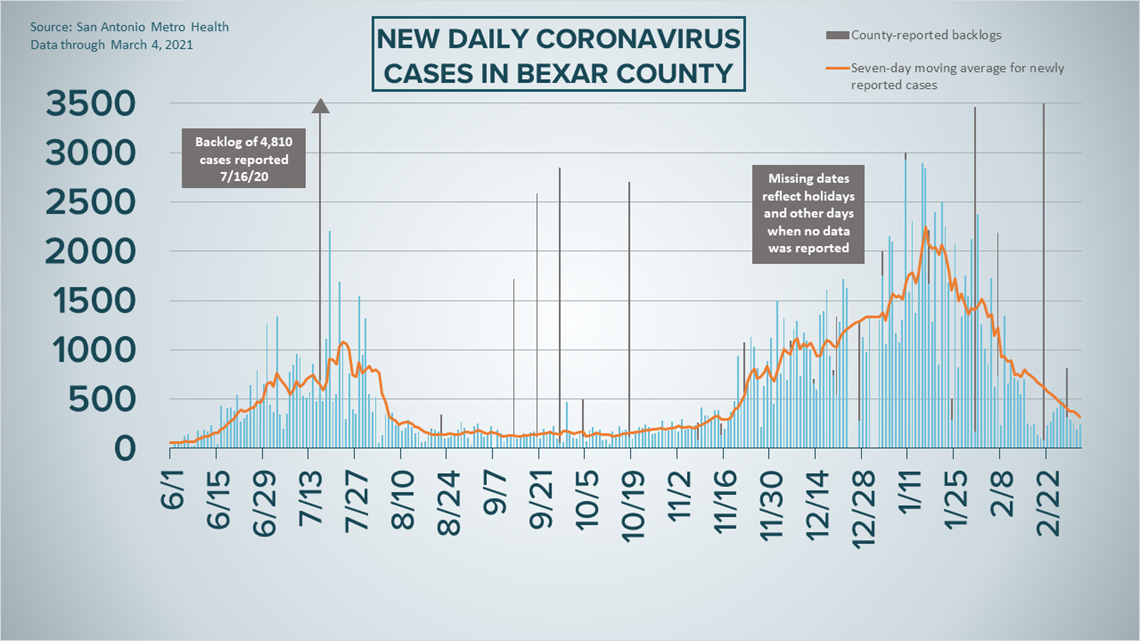
The number of county COVID-19 hospitalizations also fell on Thursday, from 401 on Wednesday to 368. Of those 368, 72 patients are on ventilators and 136 are in intensive care.

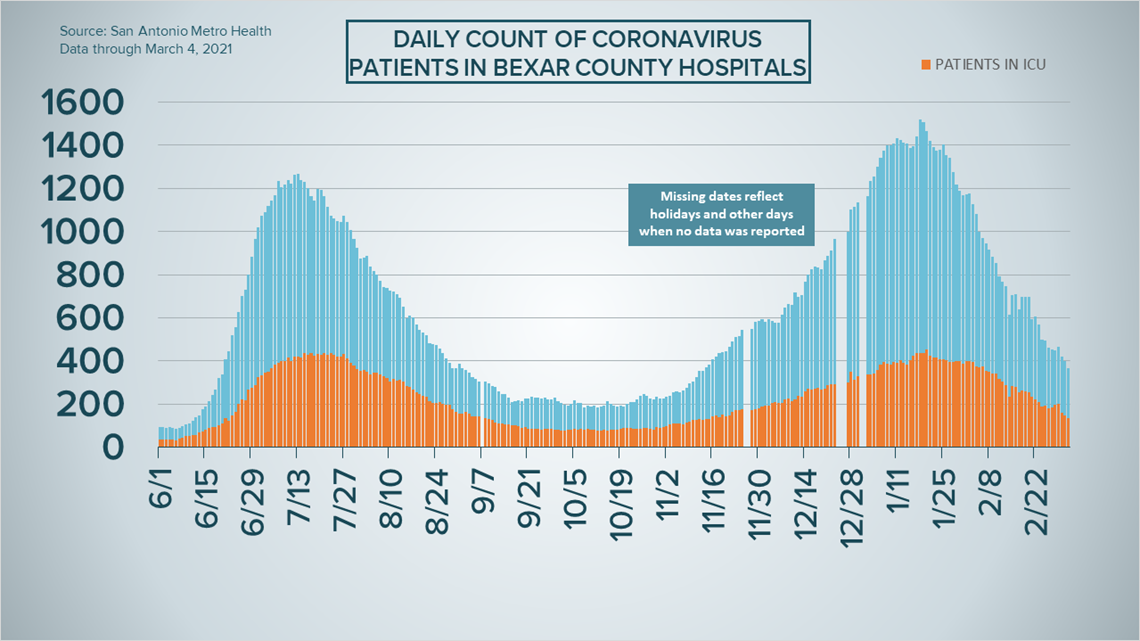
Coronavirus in Texas
The total number of novel coronavirus cases in the state since the pandemic began grew by 8,195 on Thursday, according to the Texas Department of State Health Services. That total includes 3,493 new confirmed cases, 2,410 new probable cases, and a backlog of 2,292 cases. More details can be found on this page.
Thursday's figures bring the total number of Texans diagnosed with COVID-19 to more than 2.671 million.

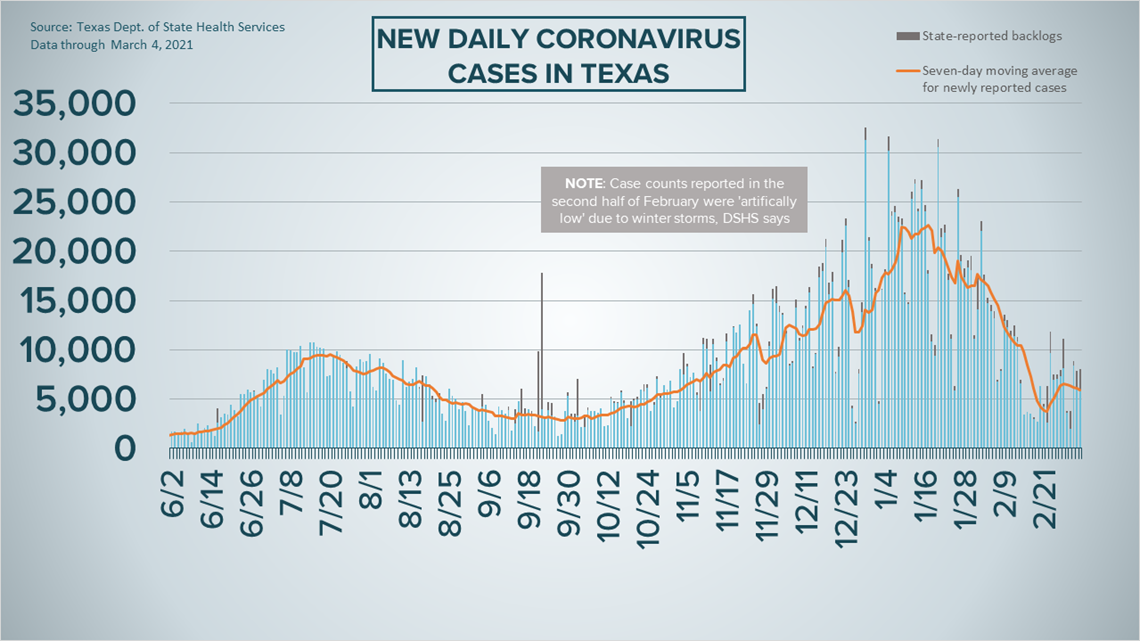
Meanwhile, state health authorities reported an additional 315 deaths from coronavirus complications in Texas. In all, 43,878 Texans have died from COVID-19.
Texas hospitalizations saw another large drop of 245 on Thursday, decreasing to 5,263 COVID-19 patients receiving treatment for their symptoms across the state. Since the pandemic's high point of 14,218 hospitalizations on Jan. 12, the figure has fallen by 63%.
The state, meanwhile, estimates that about 2.458 million Texans have recovered, while 152,267 Texans remain ill with COVID-19.
The latest update from the Texas Education Agency showed that there have been at least 184,372 cumulative cases among staff and students on Texas public school campuses through Feb. 21. That number comprises 119,810 positive student cases and 64,562 staff cases. More information can be found here.

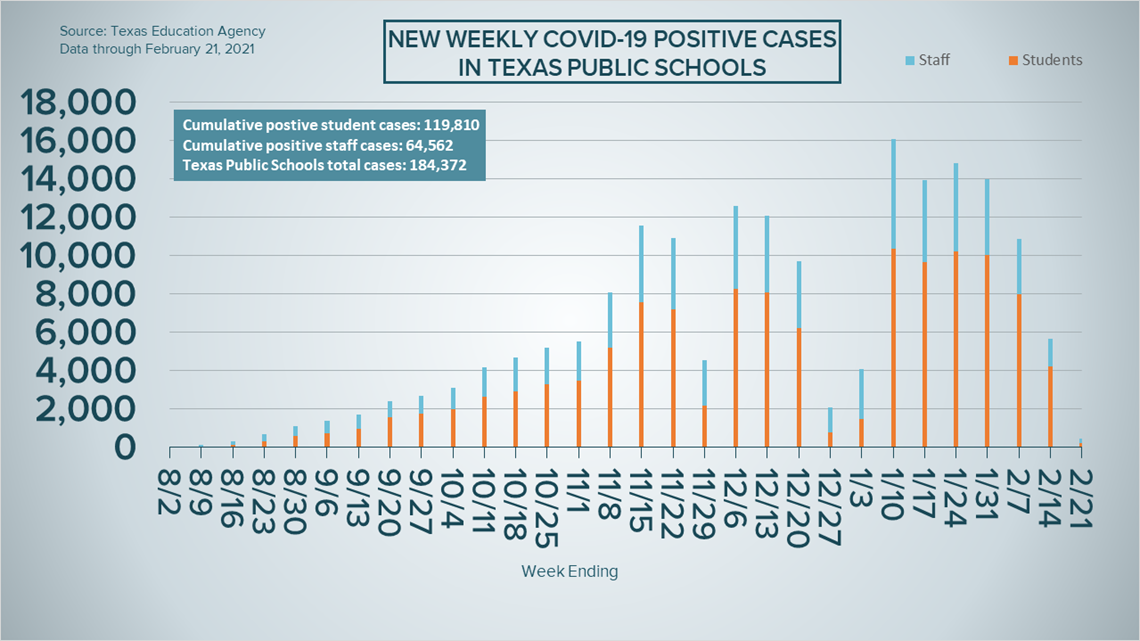
The TEA typically releases new data on school cases on Fridays.
Latest Coronavirus Headlines
- COVID-19 Vaccine Tracker: Fast facts and how to participate in Phase 1B distribution in San Antonio
- To mask up or not to mask up? It's a question Texans must now consider. So we asked some Texans at Gruene Hall.
- 'One of the few and rare successes we’ve had this year': SA teacher ready for vaccine after state expands eligibility
- ‘It’s very irresponsible’ | Judge Wolff says rollback of COVID-19 protocols marks 'sad day' for Texas
- Senate begins considering Democrats' $1.9T virus relief bill
- US jobless claims tick up to 745,000 as layoffs remain high
- CDC director: Wear masks, follow federal guidelines
- Texas among the worst in the US in vaccine distribution
Coronavirus symptoms
The symptoms of coronavirus can be similar to the flu or a bad cold. Symptoms include fever or chills, cough, shortness of breath or difficulty breathing, fatigue, muscle or body aches, headache, new loss of taste or smell sore throat, congestion or runny nose, nausea or vomiting, and diarrhea, according to the Centers for Disease Control.
Most healthy people will have mild symptoms. A study of more than 72,000 patients by the Centers for Disease Control in China showed 80 percent of the cases there were mild.
But infections can cause pneumonia, severe acute respiratory syndrome, kidney failure, and even death, according to the World Health Organization. Older people with underlying health conditions are most at risk.
Experts determined there was consistent evidence these conditions increase a person's risk, regardless of age:
- Chronic kidney disease
- COPD (chronic obstructive pulmonary disease)
- Obesity (BMI of 30 or higher)
- Immunocompromised state (weakened immune system) from solid organ transplant
- Serious heart conditions, such as heart failure, coronary artery disease, or cardiomyopathies
- Sickle cell disease
- Type 2 diabetes
The CDC believes symptoms may appear anywhere from two to 14 days after being exposed.
Human coronaviruses are usually spread...
- Between people who are in close contact with one another (within about 6 feet).
- Through respiratory droplets produced when an infected person coughs, sneezes or talks. These droplets can land in the mouths or noses of people who are nearby or possibly be inhaled into the lungs.
- Some recent studies have suggested that COVID-19 may be spread by people who are not showing symptoms.
Help stop the spread of coronavirus
- Stay home when you are sick.
- Eat and sleep separately from your family members
- Use different utensils and dishes
- Cover your cough or sneeze with your arm, not your hand.
- If you use a tissue, throw it in the trash.
Find a Testing Location
City officials recommend getting a COVID-19 test if you experience fever or chills, cough, shortness of breath or difficulty breathing, fatigue, muscle or body aches, headache, new loss of taste or smell, sore throat, congestion or runny nose, nausea or vomiting, or diarrhea.
A self-screening tool is available to see if you need a test.
Here's a Testing Sites Locator to help you find the testing location closest to you in San Antonio.

